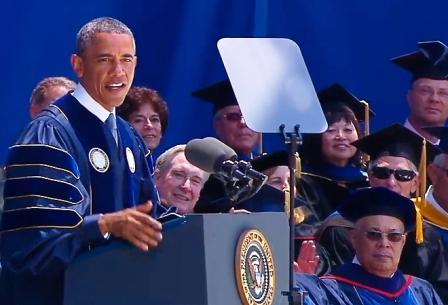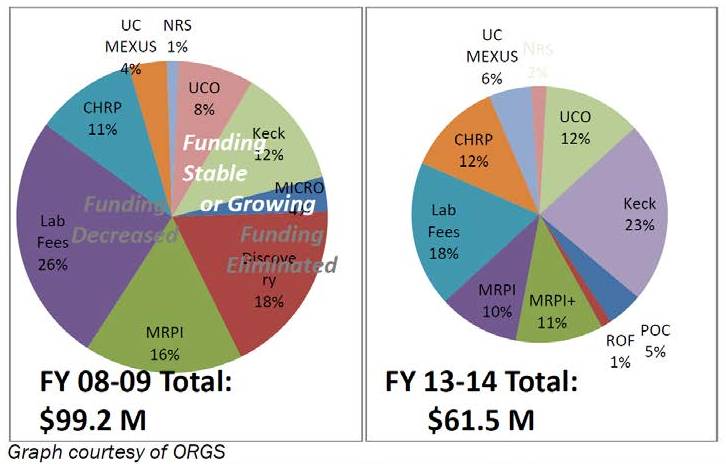June 2014
 NOTES FROM THE ACADEMIC SENATE CHAIR
NOTES FROM THE ACADEMIC SENATE CHAIR
WILLIAM JACOB
Dear colleagues,
The May 23 tragedy in Santa Barbara is on all of our minds. The Senate and all of UC offer condolences to the families of the six UCSB undergraduates whom we lost way too soon. As we mourn, we are reminded how fragile life is and ofthe critical role we play in ensuring all our students feel connected to UC. The six we lost were exemplary students, showing their commitment to a better future for all by their engagement in the community and seriousness about academics. It is my deepest hope that Senate members will respond to this tragedy by renewing their commitment to strengthen our bonds with all of our students. I also want to express my deepest appreciation for the efforts of administrators, staff, faculty and students at UCSB for their outpouring of support for each other as we pass through these difficult times.
The Senate joined forces with UC students, Regents, and administrators last month in Sacramento to discuss the challenges facing California higher education and to lobby legislators for a UC budget plan that sustains and strengthens the promise of the Master Plan for Higher Education. We were heartened to hear that many legislators were willing to commit more funds to higher education, and both houses proposed doing so, but we were deeply disappointed that the Governor was unwilling to depart from his January position of limiting the UC general fund increase to 5%. He is also unwilling to provide UCRP funding in parallel to what the state provides CSU retirement through CalPERS.
Instead of properly supporting enrollment growth and meeting our infrastructure needs, the 2014-15 budget agreement contains $50M for an “innovation fund” for competitive grants to the three higher education segments. (The legislature was opposed but the Governor wanted it.) The budget bill includes a requirement that the Regents report on projections of resources, expenditures, enrollment, and performance measures for 2015-16, 2016-17, 2017-18 by November 30, 2014 using numbers from the Department of Finance. The Senate will need to be involved in both developing proposals for the innovation fund and preparing the November 30 reports to make sure that UC academic quality-- across research, teaching, and service--is the top priority. Based upon his comments at the May Regents meeting, the Governor seems to believe that UC does not need to reverse the draconian cuts of the Great Recession. It is time for all of us to defend the University against this mentality and insist that the November 30 report call for renewing our great institution. This must be a central priority of the Senate in the coming year.
As we press for the support we need, we should be clear that UC seeks a full partnership with the state to commit to the Master Plan, which I continue to view as the foundation of UC’s greatness. I reject claims that the Master Plan is broken or obsolete. The Master Plan is not a set of rules one can make or break, but an expression of the political will needed to sustain and enhance higher education in California. It is a continuous effort, not a data set to be matched against an arbitrary standard. Unfortunately, a public conversation is underway that accepts misinformation and out-of-context data to argue, wrongly, that the Master Plan is broken or nearly so, and that California’s system of public higher education is rudderless and ineffective.
 |
President Obama speaks at the UCI commencement on June 14. Vice Chair Gilly and Chair Jacob are pictured at right, under teleprompter. Photo courtesy UC Irvine |
What do we see when we look at what is actually happening on the ground?
Here are some of the key ways UC is fulfilling its Master Plan obligations today – and helping to prove the Master Plan remains a viable driver of higher education excellence in California.
The first is undergraduate admissions. Last year, approximately 13% of California public high school graduates were offered admission to a UC campus to which they applied, exceeding the Master Plan target of 12.5% and demonstrating UC’s enduring commitment to Californians even through the financial downturn. In addition, over the past decade the Senate, administration, and the Regents have collaborated on new admissions policies that require applicant files to be examined for a breadth of accomplishment in the context of opportunity. These policies have allowed campuses to select a group of students who are more diverse and better prepared academically, while not reducing the number of admitted California high school graduates.
Second, we must also remind those arguing for greater undergraduate “throughput” that UC has the highest four-year graduation rate among public universities, despite our classes and teaching laboratories being packed with students seven days a week. UC cannot support more undergraduates without new investments in infrastructure and the full educational enterprise. This must be the focus, rather than increased “throughput” that risks undermining UC’s academic quality. And we need to remind critics that over 40% of UC undergraduate students receive Pell grants, and half pay no tuition.
The third major point is our stellar graduate education and research. The Master Plan designates UC as the State’s primary academic research institution. UC’s ten research campuses leverage a $2.8 billion state investment by bringing California a $5 billion research program that both sustains graduate and professional education and contributes to the state economy. The rapid rise of younger UC campuses into national research prominence is the result of the Master Plan framework and faculty-administrative teamwork at the individual campuses and through nurturing the “Power of Ten” at the systemwide level.
These accomplishments mean that UC provides California’s young people access to public education that rivals what other states offer only through private systems. This is the Master Plan in action, not a deviation from it.
Finally, we should not ignore UC’s public service role, another indicator of the Master Plan at work. From our great hospitals, which provide hundreds of millions of dollars in free care to the uninsured, to our Academic Preparation Programs for K-12 students, UC is a stellar public servant. Last month, Cooperative Extension celebrated its 100th Anniversary. With a presence in every California county, CE supports agriculture, provides youth with educational opportunities, and respects UC’s land-grant heritage.
|
During my final months as your chair, I will be tasking the Academic Council to advocate for restoration of UCOP support for systemwide research. UC has a tradition of supporting systemwide research initiatives that enhance education and scholarship across multiple campuses. Some systemwide entities, like the UC Observatories and Scripps Institute, are deeply rooted in our history and have propelled California into the forefront of space and ocean science, while other, newer, multi-campus initiatives in Humanities, Information Technology, and Nanotechnology stimulate scholarship and support new opportunities for collaboration and innovation that are essential to the Power of Ten. Recently, however, UCOP’s commitment has frayed, with central funds for faculty-led organized multi-campus research cut dramatically over the past five years. The UC Discovery Grant program has been eliminated, and the Multicampus Research Programs and Initiatives (MRPI) program, which had a $16.3 million budget only 5 years ago, now has a budget of less than $6 million. During this time, the systemwide research budget overseen by the Vice President for Research and Graduate studies in the Provost’s Office was cut from $99.2 million to $61.5 million (see sidebar.) This contraction is an unintended consequence of the drive to shrink UCOP.
Support for systemwide research initiatives enables collaboration and research that would be very unlikely to develop spontaneously or on a single campus. It has enhanced UC’s reputation enormously and can continue to do so. The Council will be asking UCOP to adopt a principled approach to systemwide research funding as a priority. I believe that the systemwide research budget should not be cut disproportionately to general cuts for UCOP.
As we finish the academic year and enter the summer months, I have been reflecting with gratitude about the things we have accomplished together this year. I want to remind you again that the Senate could not fulfill its mission without you, the individual faculty member.
Fiat Lux, Bill

